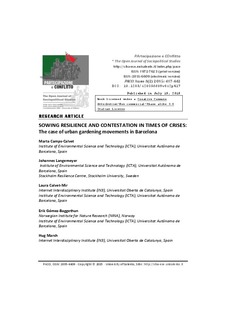Sowing resilience and contestation in times of crises: the case of urban gardening movements in Barcelona
Journal article
Permanent lenke
http://hdl.handle.net/11250/300274Utgivelsesdato
2015Metadata
Vis full innførselSamlinger
- Publikasjoner fra CRIStin - NINA [2364]
- Scientific publications [1392]
Sammendrag
Urban gardens have been observed to multiply in response to crises. However, the meaning and motivations behind the emergence of gardening movements varies greatly over space and time. In this paper we argue that bottom up urban gardening initiatives taking place in Southern European countries in form of land occupation and communalization represent forms of resistance that enhance social cohesion and collective action in times of need. Specifically, this research examines the role of urban gardens in (i) building community resilience and (ii) articulating forms of resistance and contestation to development pressure and commodified urban lifestyles. Our research is based on data collected among 27 urban gardening initiatives in Barcelona, Spain, including 13 self-governed community gardens and 14 public gardens. Data were collected from semi-structured interviews with gardeners and with staff from the Barcelona City Council. Our results show mechanisms through which urban gardens can contribute to build resilience by nurturing social and ecological diversity, generating and transmitting local ecological knowledge, and by creating opportunities for collective action and self-organization. We further examine collectively managed gardens as urban commons that emerge as a form of resistance to the privatization of public urban space, and that offer opportunities to experiment with new models of urban lifestyles. We show how gardening initiatives can be seen to represent an emerging form of urban green commons that provides a suitable ground to ‘sow’ resilience and contestation in times of crises and socio-ecological deterioration.

